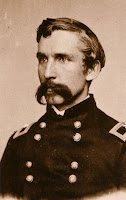
One of the secretaries at Sacred Heart Parish, Fairfield, Ohio, came across a holy card with the image of a Roman soldier with his foot on a blackbird and in his hand a cross with the word "Hodie." She first thought that "Hodie" was his name, but this Latin word for "today" seemed an unlikely name for a saint. Who was this guy?
As it turns out, the soldier pictured with the cross and the bird is named St. Expedite. In Brazil, where he is better known and more widely honored, he is known as Santo Expedito.
Although the story about Santo Expedito may be pure legend, there is enough possibility to the tale to make it intriguing if not credible.
The legend holds that a Roman soldier, now known as Expedite, heard the Gospel and was seriously considering conversion when the devil appeared to him in the form of a blackbird and cawed, "Cras," which is Latin for "tomorrow." The devil was suggesting that the soldier should pro-cras-tinate and put off his becoming a Christian. Struggling with his decision, he was heavenly inspired by the challenge to convert "hodie," today!
Having been martyred for his new found faith, the soldier's bones were buried, and only later exhumed and sent to a convent in Paris for a more proper burial. The story goes that whoever sent the package of bones to the convent marked on the parcel the instruction "Expedite" to hurry the contents on their way. When the convent received the box of bones, the common consensus was that the martyred soldier's name was Expedite.
Although Butler's Lives of the Saints questions whether such a person ever existed and casts doubts upon the story of a box so marked, the date given for St. Expedite's "feast day" is April 19. Butler notes, "Pictures of him were in existence in Germany in the eighteenth century which plainly depicted him as a saint to be invoked against procrastination."
I have not resolved the question of the story's validity, but since I'm too busy today I plan to do more research on it tomorrow. "Afterall," as Scarlett O'Hara would say, "tomorrow is another day!"

